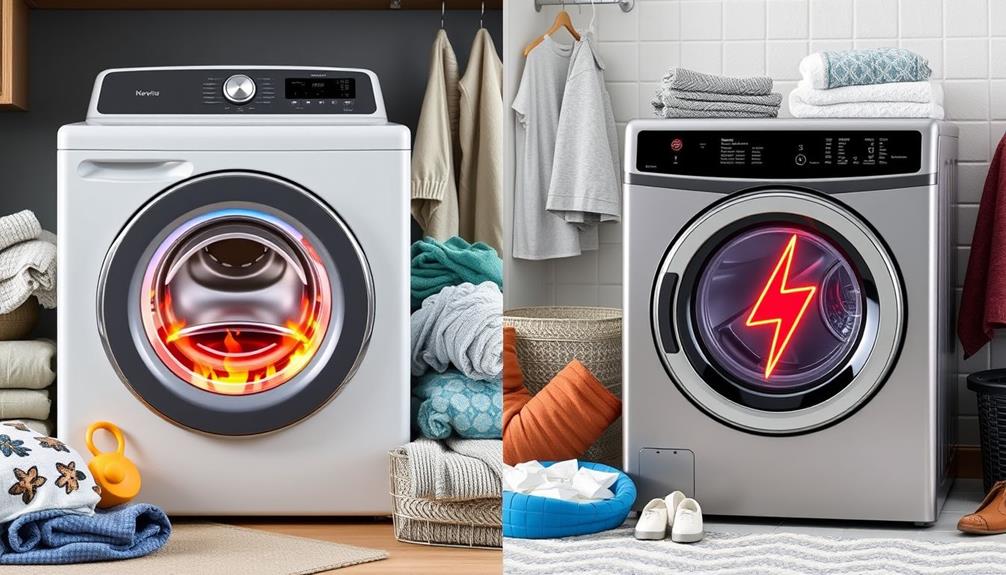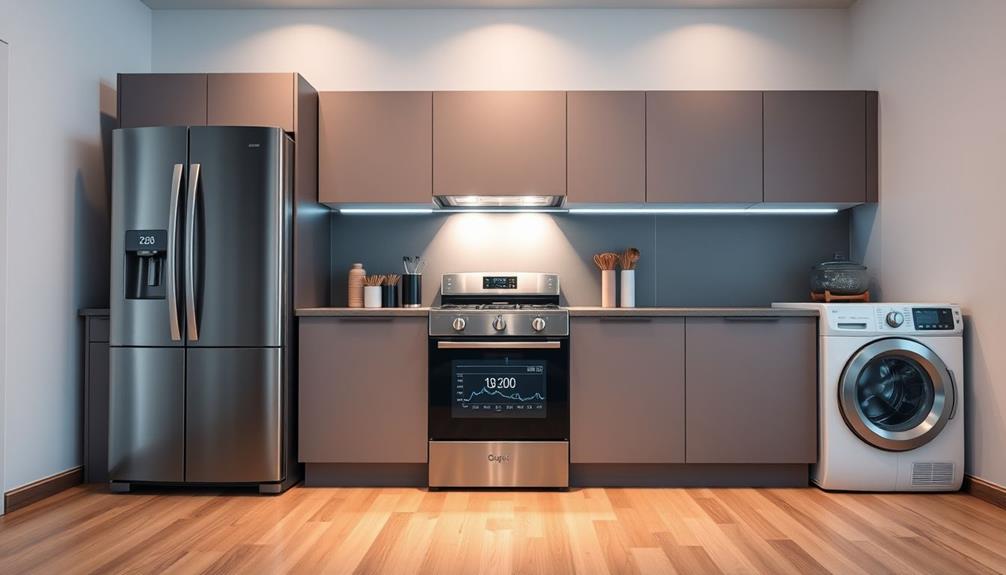Have you ever thought about the potential hidden hazards that may be present behind your household appliances?
Well, we are here to shed some light on the importance of appliance safety standards and regulations. These guidelines and rules play a pivotal role in ensuring the well-being and protection of consumers like you.
As the demand for technologically advanced appliances grows, so does the need to establish stringent safety measures. In this fast-paced world, it is crucial to understand the significance of these standards, as they ensure that the appliances we rely on are safe and reliable.
So, join us on this journey as we explore the world of appliance safety, from the role of government regulations to international standards and everything in between.

Let’s dive into the world of appliance safety together!
Key Takeaways
- Appliance safety standards and regulations are crucial for ensuring consumer well-being and minimizing accidents or hazards.
- Government involvement is necessary to establish and enforce safety regulations, as manufacturers may prioritize cost-cutting measures over safety without regulations.
- Safety standards ensure appliances undergo rigorous testing and meet specific requirements, protecting consumers from potential hazards and accidents.
- Compliance with safety standards increases consumer trust in the products they purchase and promotes innovation and technological advancements in the industry.
Importance of Appliance Safety Standards
The importance of appliance safety standards lies in our commitment to ensuring the well-being of consumers and minimizing the risk of accidents or hazards. Government involvement is crucial in establishing and enforcing these standards to protect consumers. Without such regulations, manufacturers may prioritize cost-cutting measures over safety, putting consumers at risk.
By implementing safety standards, the government ensures that appliances undergo rigorous testing and adhere to specific safety requirements.
Consumer awareness is another key aspect of appliance safety standards. It’s essential for consumers to be informed about potential hazards and how to use appliances safely. Manufacturers are responsible for providing clear instructions and warnings, but consumer awareness plays a vital role in preventing accidents. Consumers should be aware of potential risks associated with specific appliances and understand the importance of proper maintenance and usage.

Appliance safety standards also promote innovation and technological advancements. By setting minimum safety requirements, these standards encourage manufacturers to develop safer and more efficient appliances. This benefits both consumers and manufacturers, as it fosters a competitive market that prioritizes safety and quality.
Role of Government in Appliance Regulations
When it comes to appliance regulations, the role of government is crucial.
Governments enforce safety regulations to ensure that appliances meet certain standards and don’t pose a risk to consumers.
These regulations have a significant impact on manufacturers, as they must comply with the safety requirements set by the government.

Government Enforcing Safety Regulations
We actively enforce safety regulations to ensure appliance compliance with government standards. This is an important aspect of our role in protecting consumer safety and ensuring the quality of appliances in the market.
Here are some key points to consider regarding our government enforcement of safety regulations:
- Monitoring and Inspections: We conduct regular inspections to ensure that appliances meet safety standards and regulations.
- Product Testing: We require manufacturers to conduct rigorous testing to ensure their appliances are safe for use.
- Enforcing Penalties: We have the authority to impose penalties on manufacturers who fail to comply with safety regulations.
- Educating Consumers: We provide information and resources to educate consumers about safety standards and how to identify compliant appliances.
By actively enforcing safety regulations, we strive to create a safe and reliable marketplace for consumers.
Now, let’s move on to discuss the impact of these regulations on manufacturers.

Impact of Regulations on Manufacturers
As government regulators, our role in appliance regulations includes overseeing the impact of safety standards on manufacturers. Government regulations play a crucial role in ensuring that manufacturers meet certain safety requirements when producing appliances. These regulations are put in place to protect consumers from potential hazards and ensure the overall safety of the products in the market.
Manufacturers have a responsibility to comply with these regulations and ensure that their appliances meet the required safety standards. Failure to do so can result in penalties, recalls, and damage to their reputation. It is our duty as regulators to monitor and enforce these regulations, conducting inspections and audits to ensure manufacturers are meeting their responsibilities.
Table: Impact of Government Regulations on Manufacturers
| Role of Government Regulations | Impact on Manufacturers |
|---|---|
| Ensuring compliance with safety standards | Increased production costs due to additional safety measures |
| Conducting inspections and audits | Ensuring product safety and quality |
| Imposing penalties for non-compliance | Encouraging manufacturers to prioritize safety |
| Issuing recalls for unsafe products | Protecting consumers from potential hazards |
| Upholding reputation and consumer confidence | Promoting trust in the market |
With government regulations in place, manufacturers are held accountable for the safety of their appliances. This ensures that consumers can trust the products they purchase and use. However, it is important to note that safety standards can vary across different countries. In the next section, we will explore international appliance safety standards and their impact on manufacturers.

International Appliance Safety Standards
When it comes to appliance safety, global safety requirements play a crucial role. International appliance safety standards ensure that manufacturers adhere to specific guidelines and regulations to protect consumers from potential hazards.
Compliance with these standards often requires manufacturers to obtain certifications, further ensuring the safety of their products. Understanding international appliance safety standards is essential for manufacturers to navigate the global market and ensure the safety of their appliances for consumers worldwide.
Global Safety Requirements
In order to ensure the safety of appliances worldwide, it’s crucial to adhere to global safety requirements set forth by international appliance safety standards. These global regulations and appliance safety guidelines are designed to protect consumers from potential hazards and ensure that appliances meet certain safety standards.
Here are some key aspects of global safety requirements:

- Compliance Testing: Appliances must undergo rigorous testing to ensure their safety and compliance with international standards.
- Marking and Labeling: Proper marking and labeling of appliances is essential to provide consumers with important safety information and warnings.
- Product Documentation: Manufacturers must provide comprehensive documentation, including user manuals and safety instructions, to ensure safe and proper use of appliances.
- Continuous Improvement: Global safety requirements promote continuous improvement in appliance safety through regular updates and revisions to standards.
Compliance and Certifications
To ensure compliance with international appliance safety standards, manufacturers must obtain certifications to demonstrate that their products meet the required safety regulations. The certification process involves rigorous testing and evaluation of the appliances to ensure that they meet the necessary safety criteria.
This process can be challenging for manufacturers, as they must ensure that their products comply with the specific safety standards of different countries and regions. Compliance challenges may arise due to variations in regulations, testing procedures, and labeling requirements across different markets. Manufacturers must navigate through these complexities to ensure that their products are safe for consumers worldwide.
Additionally, obtaining certifications from recognized certification bodies is essential to gain the trust and confidence of consumers. These certifications serve as a mark of quality and safety, assuring consumers that the appliance has undergone thorough testing and meets the necessary safety standards.
Impact on Manufacturers
As manufacturers, we frequently encounter challenges and responsibilities due to the impact of international appliance safety standards on our operations. These standards play a crucial role in ensuring the safety and reliability of our products, but they also present certain manufacturing challenges.

Here are some key impacts on manufacturers:
- Increased costs: Adhering to international safety standards often requires additional investments in research, development, and testing processes. This can lead to higher manufacturing costs and affect our bottom line.
- Compliance complexity: International standards vary across different regions, adding complexity to the manufacturing process. We must stay updated on the latest regulations and ensure our products meet the requirements of each market.
- Market competitiveness: Compliance with international safety standards is essential for maintaining a competitive edge in the global market. Failing to meet these standards can result in loss of consumer trust and market share.
- Continuous improvement: International standards drive innovation and encourage manufacturers to constantly improve their products’ safety features. This fosters a culture of continuous improvement and ensures the highest level of safety for consumers.
Navigating the impact of international appliance safety standards requires careful planning, investment, and adherence to best practices. As manufacturers, we must stay proactive and adapt to these challenges to succeed in a highly competitive market.
Common Appliance Safety Hazards
We often encounter common appliance safety hazards in our daily lives. These hazards can lead to accidents and injuries if not properly addressed. It is important to be aware of these hazards and take necessary precautions to prevent accidents. Here are some common appliance safety hazards and ways to prevent them:
| Common Appliance Safety Hazards | Preventive Measures |
|---|---|
| Electrical Shock | – Ensure appliances are properly grounded. |
- Avoid using appliances with frayed cords.
- Keep appliances away from water. | | Burns | – Use oven mitts or pot holders when handling hot objects.
- Keep flammable materials away from heat sources.
- Use caution when using stovetops and ovens. | | Tripping Hazards | – Keep cords and wires away from walkways.
- Secure cords to prevent them from being pulled or tripped over.
- Avoid overcrowding outlets and power strips. | | Tip-Over Accidents | – Secure top-heavy appliances to prevent tipping.
- Place heavy objects on lower shelves.
- Follow manufacturer’s instructions for proper installation. | | Gas Leaks | – Install a carbon monoxide detector.
- Regularly inspect gas appliances for leaks.
- Leave the area and call for help if you smell gas. |
Testing and Certification Process
Now let’s delve into the testing and certification process for appliance safety standards and regulations. When it comes to ensuring the safety of appliances, thorough testing and certification are crucial. Here is a breakdown of the testing process and certification requirements:

- Testing Process:
- Initial Evaluation: Appliances undergo a comprehensive assessment to identify potential safety risks and hazards.
- Performance Testing: Appliances are subjected to rigorous tests to evaluate their functionality and performance under different conditions.
- Safety Testing: Various safety aspects such as electrical, mechanical, and thermal safety are assessed to ensure compliance with standards.
- Environmental Testing: Appliances are tested for their ability to withstand extreme temperatures, humidity, and other environmental factors.
- Certification Requirements:
- Compliance with Standards: Appliances must meet all applicable safety standards, regulations, and guidelines set by recognized organizations.
- Documentation: Manufacturers are required to provide detailed documentation, including test reports and product specifications, to support the certification process.
- Regular Audits: Certified appliances undergo periodic audits to maintain compliance and ensure ongoing safety.
By following this rigorous testing and certification process, manufacturers can demonstrate their commitment to producing safe and reliable appliances.
In the next section, we’ll explore the importance of compliance with appliance safety standards in more detail.
Compliance With Appliance Safety Standards
Compliance with appliance safety standards is of utmost importance in ensuring consumer protection. By adhering to these standards, manufacturers demonstrate their commitment to producing safe and reliable appliances.
Compliance also helps to prevent accidents and injuries, providing consumers with peace of mind that the appliances they purchase meet the necessary safety requirements.

Importance of Compliance
Ensuring our appliances comply with safety standards is essential for protecting both ourselves and our loved ones. The importance of appliance compliance can’t be overstated, as it ensures that the products we use in our daily lives are safe and reliable.
Here are four reasons why compliance with appliance safety standards is crucial:
- Consumer Awareness: Compliance helps consumers make informed decisions by providing clear information about the safety features and risks associated with different appliances.
- Risk Reduction: Compliance with safety standards minimizes the risk of accidents, such as electrical shocks, fires, or gas leaks, that can result from using non-compliant appliances.
- Quality Assurance: Compliance ensures that appliances are manufactured and tested to meet specific safety requirements, guaranteeing their reliability and durability.
- Legal Compliance: Non-compliant appliances may not meet the legal requirements of certain jurisdictions, which can lead to penalties or restrictions on their sale and distribution.
Ensuring Consumer Protection
As consumers, we prioritize appliance safety standards to ensure our protection. It’s essential for us to be aware of these standards and regulations to make informed decisions when purchasing appliances. By understanding the importance of compliance, we can avoid potential risks and ensure the safety of ourselves and our families.
One way to promote consumer awareness is through product labeling. Manufacturers are required to provide clear and accurate information on their products, including any potential hazards or safety precautions. This allows us to make informed choices based on our needs and preferences.

Additionally, product liability laws play a crucial role in ensuring consumer protection. These laws hold manufacturers accountable for any defects or hazards in their products. If an appliance doesn’t meet the necessary safety standards, consumers have the right to seek compensation for any injuries or damages caused.
Consumer Rights and Appliance Safety
To protect our rights as consumers, we abide by appliance safety standards and regulations. These regulations ensure that the appliances we use in our daily lives are safe, reliable, and meet certain quality standards. Consumer protection is a top priority for industry associations and regulatory bodies, as they aim to safeguard the interests of consumers and maintain trust in the marketplace.
Here are some key aspects of consumer rights and appliance safety:
- Product Testing: Appliance manufacturers are required to conduct thorough testing to ensure that their products meet safety standards. This includes testing for electrical safety, fire resistance, and performance reliability.
- Labeling and Certification: Appliances that comply with safety standards are labeled with certification marks, indicating that they’ve been tested and meet the necessary requirements. These marks help consumers make informed choices and identify safe appliances.
- Recall Procedures: In the event that a safety issue is identified with a particular appliance, manufacturers are required to implement recall procedures to remove the faulty products from the market. This helps protect consumers from potential harm and ensures that they can access safe alternatives.
- Consumer Education: Industry associations work towards educating consumers about their rights and responsibilities when it comes to appliance safety. This includes providing information on product recalls, safety guidelines, and steps to take in case of an appliance-related incident.
Appliance Recalls and Safety Alerts
After discussing the importance of consumer rights and appliance safety, let’s now shift our focus to the critical aspect of appliance recalls and safety alerts.

Appliance safety recalls play a crucial role in ensuring the well-being of consumers and preventing potential hazards. These recalls occur when a manufacturer identifies a defect or potential danger in their product and takes action to correct the issue. It’s essential for consumers to stay informed about appliance safety recalls to protect themselves and their families from any potential harm.
The importance of safety alerts can’t be overstated. When a safety issue arises, manufacturers issue safety alerts to notify consumers about the potential risks associated with a particular appliance. These alerts provide detailed information about the problem, including how to identify the affected product and steps to take to address the issue. By promptly responding to safety alerts, consumers can mitigate the risks and prevent accidents or injuries.
In addition to staying informed about appliance safety recalls and safety alerts, consumers should also register their appliances with the manufacturer. This allows manufacturers to contact consumers directly in case of any safety concerns or recalls. Regularly checking the manufacturer’s website and subscribing to email notifications can also help consumers stay updated on any potential safety issues.
Industry Associations and Appliance Safety
Joining industry associations is an effective way for manufacturers to stay informed about appliance safety standards and regulations. These associations play a crucial role in shaping and establishing industry-wide guidelines that ensure consumer protection.

Here are some key benefits of being part of industry associations in relation to appliance safety:
- Access to information: Industry associations provide manufacturers with up-to-date information on the latest safety standards and regulations. This helps them stay ahead of the curve and ensure compliance with the necessary requirements.
- Networking opportunities: Being part of industry associations allows manufacturers to connect with other professionals in the field. This networking can facilitate the exchange of knowledge, best practices, and lessons learned, ultimately leading to improved appliance safety.
- Advocacy and representation: Industry associations serve as advocates for manufacturers, representing their interests and concerns to regulatory bodies. They can provide valuable input during the development of new safety standards, ensuring a balanced approach that considers both consumer protection and industry feasibility.
- Collaborative problem-solving: By joining industry associations, manufacturers gain access to a collaborative platform where they can work together to address common safety challenges and share solutions.
As manufacturers continue to engage in industry associations, they contribute to the ongoing improvement of appliance safety standards and regulations. This collaboration and exchange of knowledge are essential for the development of future trends in appliance safety.
Future Trends in Appliance Safety Standards
We anticipate advancements in appliance safety standards and regulations as technology continues to evolve. As new technologies are developed and incorporated into appliances, it is essential to ensure that they meet the highest safety standards to protect consumers and prevent accidents. Here are some future trends in appliance safety standards that we can expect to see in the coming years:
| Trend | Description | Impact |
|---|---|---|
| Smart Home Integration | Appliances will be designed to seamlessly integrate with smart home systems, allowing for remote monitoring and control. | This will enhance convenience and safety by providing real-time alerts and the ability to remotely shut off appliances in case of emergencies. |
| Enhanced Sensors | Appliances will be equipped with advanced sensors to detect potential hazards, such as gas leaks or overheating. | This will enable appliances to automatically shut down or send alerts when dangerous conditions are detected, reducing the risk of accidents. |
| Artificial Intelligence | AI-powered appliances will analyze data and learn from user habits to predict and prevent potential safety issues. | This will lead to proactive safety measures, such as automatically adjusting settings to minimize risks or providing personalized safety recommendations to users. |
| Cybersecurity Measures | With the rise of connected appliances, robust cybersecurity measures will be implemented to protect against hacking and unauthorized access. | This will safeguard users’ privacy and prevent malicious actions that could compromise appliance safety. |
These future trends in appliance safety standards demonstrate how technological advancements are shaping the future of appliance safety. By embracing these innovations, we can ensure that appliances remain safe and reliable in an increasingly interconnected world.

Frequently Asked Questions
How Often Are Appliance Safety Standards Reviewed and Updated?
Appliance safety standards are reviewed and updated regularly to ensure their effectiveness and relevance. The frequency of these reviews depends on various factors such as technological advancements, emerging safety risks, and changes in regulations.
It’s crucial to update these standards to address any new hazards and ensure that appliances are safe for use. Regular reviews help maintain the highest level of safety and protect consumers from potential harm.
What Are Some Examples of Common Appliance Safety Hazards?
Electrical malfunctions and improper installation can lead to common appliance safety hazards. For example, a faulty circuit in a refrigerator can cause overheating and potentially start a fire. Inadequate grounding during installation of a washing machine can result in electric shocks.
These hazards highlight the importance of following appliance safety standards and regulations. By regularly reviewing and updating these standards, we can ensure that appliances are designed, installed, and operated safely, protecting both individuals and property.

How Can Consumers Ensure That the Appliances They Purchase Comply With Safety Standards?
To ensure that the appliances we buy comply with safety standards, consumer awareness is crucial. We need to be informed about the specific safety standards and regulations that apply to different types of appliances.
Additionally, looking for third-party certifications, such as the UL mark, can provide reassurance that the appliance has undergone rigorous testing. These certifications indicate that the appliance meets industry safety standards and regulations.
What Are the Consequences for Manufacturers Who Do Not Comply With Appliance Safety Standards?
Not complying with appliance safety standards can have serious consequences for manufacturers. These consequences can include heavy fines, legal action, and damage to their reputation.
It’s crucial for manufacturers to understand the importance of adhering to these standards to ensure the safety of consumers and avoid these negative outcomes.

Are There Any Specific Regulations or Standards for Appliances Used in Commercial or Industrial Settings?
In commercial and industrial settings, there are indeed specific regulations and standards that appliances must adhere to. These guidelines ensure the safety and functionality of the appliances used in these environments. They cover various aspects such as electrical safety, mechanical stability, and fire prevention.
Compliance with these regulations is crucial to prevent accidents and maintain a safe working environment. Manufacturers must carefully design and test their appliances to meet these specific requirements before they can be used in commercial or industrial settings.
What Are the Key Appliance Safety Standards and Regulations to Be Aware of?
When it comes to appliance safety, it’s crucial to be aware of the key regulations and standards in place. Following appliance safety tips and being informed about industry regulations can help prevent accidents and ensure the proper functioning of household appliances.
Conclusion
In conclusion, appliance safety standards and regulations play a crucial role in protecting consumers from potential hazards. By ensuring that appliances meet strict safety requirements, governments and industry associations are working together to prioritize consumer safety.
However, it’s important for consumers to stay informed about appliance recalls and safety alerts, and to exercise their rights when it comes to purchasing safe appliances.

Let’s stay plugged in to the future trends in appliance safety to ensure our homes are secure.









